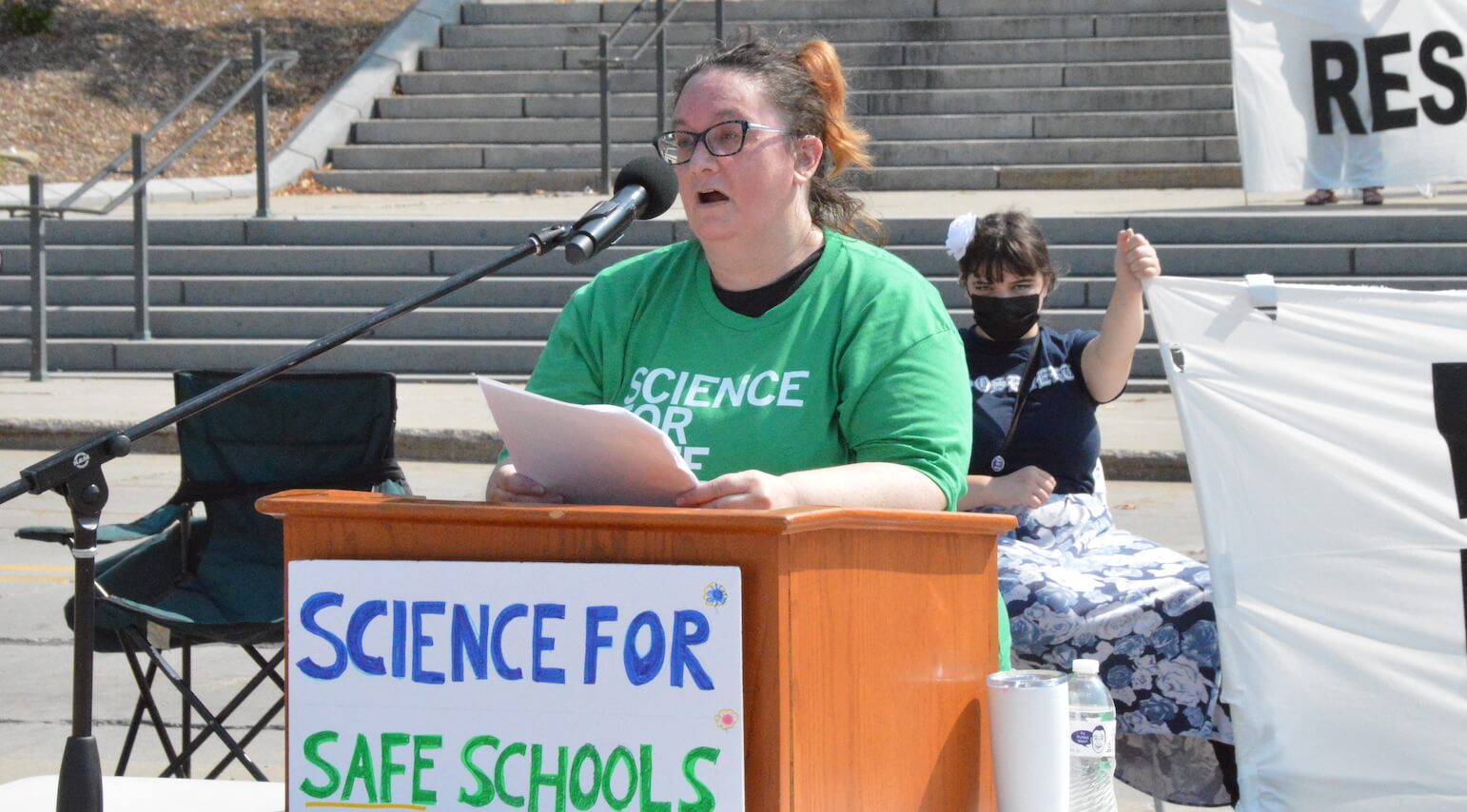
Photo by Starting Line staff
Iowans with disabilities are fed up and sounding the alarm on the way the state has essentially moved on from the pandemic as COVID-19 continues to spread.
For a number of reasons, people with disabilities are more vulnerable to COVID than able-bodied people, even if they are vaccinated.
Some need caretakers to come into their homes and some have weakened immune systems or other conditions that would make a COVID infection more severe for them.
For Erin Dahl, a disability rights activist who lives in Waukee, getting COVID could mean seizures and brain damage. Her husband has a rare heart condition caused by a childhood illness that led to the removal of the protective sac around his heart.
“So he and I are the problem; not the kids, but they can give it to us,” she said.
[inline-ad id=”1″]
Both are vaccinated, but Dahl said a breakout case would be catastrophic for them and the two disabled friends they care for—one with amyotrophic lateral sclerosis and one with Parkinson’s. There’s also evidence the vaccine’s effectiveness decreases sooner for immunocompromised people.
Increased risk, the lack of effort to mitigate that risk, the continued spread and emergence of new variants, and Iowa laws blocking localities from requiring some mitigation efforts are all part of the reason Iowa disability leaders are raising their voices.
“One of the most prevalent concerns the disability community has is being considered worthy,” said Julie Russell-Steuart, chair of the Iowa Democratic Party’s Disability Caucus, in an email. “Worthy of education, worthy of safety, worthy of saving, even.”
Russell-Steuart has a disability and her husband has chronic health conditions putting him at risk.
[inline-ad id=”2″]
The CDC has a list of people who may have an increased risk of getting COVID or having an unrecognized illness. It includes people who can’t avoid close contact with others, people who can’t understand or practice preventative measures, and those who can’t communicate their symptoms.
Disabilities exist on a spectrum as do the risk factors, but advocates agree widespread mitigation efforts would keep them—and those without disabilities—safer.
That includes masking in communities with high spread, keeping six feet away from others, contact tracing, surveillance testing, and notifying people about potential exposure. It also includes regular, accessible data so people can make the best choice for themselves.
“Without the data, it’s impossible to make decisions based on science for your family,” Russell-Steuart said. “If Reynolds wants Iowans to make the right choices, then the data better be there.”
[inline-ad id=”3″]
Iowa stopped publishing daily updates to its coronavirus database in July and instead releases new data every Wednesday.
Advocates are also concerned about violations of federal education legislation for children with disabilities. The biggest mentioned is the Individuals with Disabilities Education Act that mandates students with disabilities who qualify for special education have individual education plans to meet their needs.
Another oft-mentioned federal law is section 504 of the Rehabilitation Act, which ensures schools provide children with disabilities the services and accommodations they need to have equal access to education.
Dahl said online classes without a live teacher or curriculum that matches their school’s violates those requirements for children with disabilities because the education isn’t equal.
Some Iowa school districts are using Edgenuity, a third-party, online education program, for a virtual option this school year. It requires more parent supervision, and though it will be monitored by an Iowa-certified teacher, it’s not the same as Zoom classes.
[inline-ad id=”4″]
And the disability community has had enough.
The Disability Caucus, Russell-Steuart and Dahl joined other Iowa moms to organize the Safe At School Sit-in in front of the Iowa Capitol before school started. There, the people who gathered asked Gov. Kim Reynolds to remove the ban on schools requiring masks for students and faculty she passed in May.
Dahl and Russell-Steuart also issued separate ethics violations complaints against the state senators who passed that bill, asserting it discriminates against people with disabilities by ignoring the risk posed to them by pervasive spread in their communities.
On Monday, Fran Parr, a Council Bluffs mother, filed a lawsuit in Polk County District Court over the law. It names Iowa Department of Education Director Ann Lebo, Iowa Department of Public Health Director Kelly Garcia, and Reynolds as plaintiffs.
Dahl thinks the efforts will be enough to make a change, but if not, she and other activists are ready to stage more protests and keep the pressure on elected leaders.
“You cannot make public health decisions without public health data,” she said. “It is your responsibility to care for your community. You are part of a community. Act like it.”
by Nikoel Hytrek
08/26/21
[inline-ad id=”0″]
Politics

Biden marks Earth Day by announcing $7 billion in solar grants
The Biden administration on Monday announced the recipients of its Solar For All Program, a $7 billion climate program that aims to lower energy...

6 terrifying things that could happen if the Comstock Act is used to target abortion
Does 1873 sound like a really, really long time ago? Well, that’s because it is—but if Republicans and far-right anti-abortion activists have their...
Local News

No more Kum & Go? New owner Maverik of Utah retiring famous brand
Will Kum & Go have come and gone by next year? One new report claims that's the plan by the store's new owners. The Iowa-based convenience store...

Here’s a recap of the biggest headlines Iowa celebs made In 2023
For these famous Iowans, 2023 was a year of controversy, career highlights, and full-circle moments. Here’s how 2023 went for the following Iowans:...





